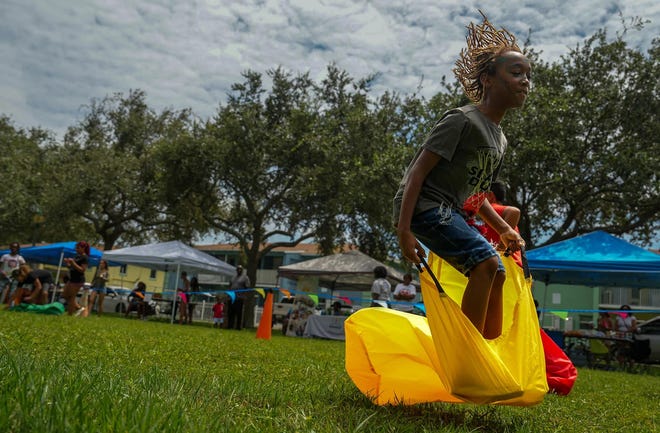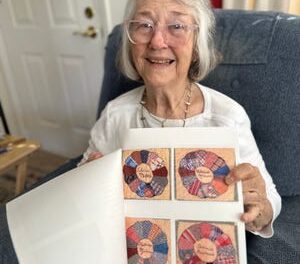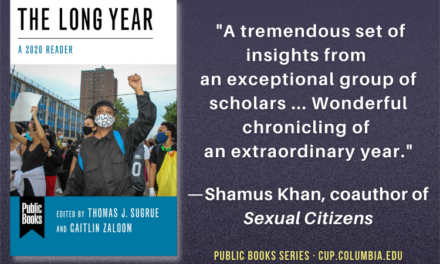
WEST PALM BEACH — Birth. A slow death. And then, rebirth.
Pleasant City, a Black community north of downtown West Palm Beach, has experienced each. In that, the community matches the experiences of so many of its residents.
Those residents gathered Saturday in the shade of trees at Blum Park on 23rd Street for what they called a “family reunion.” Others might have called it a block party or simply a community gathering. But, in Pleasant City, ties of race, of history and of family bind so many, Saturday’s event, which drew several hundred people, could only ever be called a family reunion.
Old men reminisced in lawn chairs. Teenage boys tossed a football. Children performed in a talent show and chased one another when they weren’t on stage. Women ran the show, using a microphone to announce the talent show performers and reminding residents why they were all there — and it wasn’t just for the conch and shrimp goodies on sale under a tent.
“This is important,” said Asia Taylor, a relatively new resident of Pleasant City but one who has already been drafted by her neighbors to speak up for the community. “Being one of the older Black communities, it has been overlooked.”
Pleasant City was established in the early years of the 20th century as a home for the men and women who worked in the hospitality industry that boomed in the years after Henry Flagler built a railroad to the Florida Keys.
Those men and women and others — teachers, business owners, lawyers — snapped up the small, neat houses in the shadow of what into West Palm Beach’s bustling downtown.
For decades, it thrived, a self-sufficient oasis of Black life.
“It was good,” said Mike Odum, who was born and raised in Pleasant City. “We had a nice childhood. Everybody knew everybody. There were a lot of Black businesses.”
But urban decay, fed by drugs and crime, ate away at the fabric of the community. The crack cocaine epidemic of the 1980s almost swallowed Pleasant City.
Odum almost got gobbled up, too. Now 65, Odum was born and raised in Pleasant City. He struggled with drug addiction as the crack epidemic destroyed lives in the mid-1980s.
When Odum went to rehab, he had no way of knowing he’d play a role in Pleasant City’s rebirth.
That was also true for Edwin Harper, another longtime Pleasant City resident whose life led him to crime and a lengthy prison sentence. Odum, director of community relations for the West Palm Beach Housing Authority, was already at work, helping to rebuild the community in the early 2000s, as Harper completed his sentence.
“I went from a crack house into rehab and to community relations,” Odum said. “I literally helped tear down the houses I was smoking in. We came back and rebuilt.”
Pleasant City, still struggling with drugs and crime, now has green shoots of success — workforce and affordable housing, townhouse complexes.
“I got teachers, sheriff’s deputies, people that work, people that pay taxes,” Odum said. “We’re moving in the right direction. I see a rising community.”
That’s what Harper said when he returned in 2016.
Pleasant City used to have an annual community gathering, but some of its history has been lost to time. “We don’t know when the first one was, and everyone will argue about when the first one was,” Taylor said.
All that mattered to Harper was that it wasn’t being held any longer. He rolled up his sleeves, knocked on doors and organized a rebirth of Pleasant City’s community gathering. Harper died in 2019, but his work lives on.
“Thank you, Ed Harper, for continuing to make Pleasant City great,” said Bernita Banks, who grew up in the community and served as master of ceremonies for Saturday’s event. “He is no longer with us, but he will always be in our hearts.”
Harper’s 39-year old daughter, Tiffany Harper, accepted an award on her father’s behalf. “Pleasant City was embedded in his heart,” Tiffany Harper said. “He would do nothing but give back.”
As music played and children danced Saturday, new challenges loomed.
Pleasant City’s square blocks, its comparatively inexpensive homes and businesses, stand as so many tasty morsels for hungry developers, eager to use their deep pockets to buy it all up and turn the community into a place current residents can’t afford. It’s a 27-block area bounded by 23rd and 15th streets on north and south, Dixie Highway on the east, and the Florida East Coast Railway on the west.
West Palm Beach Mayor Keith James, who attended Saturday’s gathering along with other elected and non-elected officials from the city, said that process is already underway. James, the first Black person to serve as mayor since the city went to a form a government that gives vast authority to its chief executive, said he’s working to preserve Pleasant City for the residents of Pleasant City.

“I’m looking into seeing if we can designate some of these areas for homeownership for legacy residents,” James said.
As West Palm Beach experiences a development boom, its echoes are growing louder in Pleasant City.
“I’m trying to have these conversations sooner rather than later,” the mayor said. “If we wait even a year, it could be too late.”
Wayne Washington is a journalist covering West Palm Beach, Riviera Beach and race relations at The Palm Beach Post. You can reach him at wwashington@pbpost.com. Help support our work; subscribe today.




